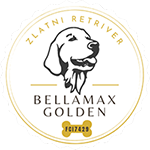
Golden Retriever Puppy
The very process of bringing new life into the world begins in the warmth of our home. As we’ve mentioned many times, our puppies live in our home from the very first minute of their lives. The trust of our females and the love they receive are the foundation of a strong and happy family.
We closely monitor the development of each puppy every day and take great care of their well-being.
Puppy Development from Birth
To ensure puppies grow up happy and healthy, it’s important to understand their needs at each stage of development. Young puppies require special care. Many exciting changes occur in puppies from birth to three months of age.


What Happens from Birth to 2 Weeks of Age?
The first hours of a puppy’s life are crucial for its development. The most important thing is that the puppy starts nursing immediately after birth. The first milk produced by the mother is called colostrum, and it provides antibodies that establish passive immunity in newborn animals.
Urination and defecation in this period are triggered by the mother licking the area around the puppy’s anus.
If the litter is raised artificially, it’s important to support natural nursing behavior and stimulation of the anal area. During bottle feeding, the puppy should also be allowed to perform rhythmic paw movements—“pushing for milk”—by offering a rolled-up blanket or cloth, or by holding your hand in front of it. Stimulation through gentle circular massages on the belly and anal area helps promote urination and defecation.
During the first two weeks of life, puppies spend most of their time sleeping, and all their energy goes into growth. By the end of the first week, their birth weight usually doubles.
Since in this stage the puppy only seeks warmth, food, and sleep, the breeder’s (our) job is to ensure that the mother is provided with everything she needs to raise the litter without disturbance. By caring for our females, we are also caring for our puppies.

When Do Puppies Open Their Eyes and Start to Hear?
Puppies are born blind and deaf, with their eyes and ears closed.
From the second week of life, their senses of sight and hearing begin to develop. When their eyes open (between the 10th and 15th day), their vision is still weak but gradually improves day by day. Hearing ability starts to develop by the end of the third week.

Supplemental Feeding of Puppies
During the first four weeks of life, feeding is the mother’s responsibility. At this stage, the best nutrition for the puppy is the mother’s milk. Therefore, it is advisable not to separate the puppies from their mother during this period to allow regular nursing. During this time, it is very important for the mother to receive proper nutrition, as she needs to produce milk for the puppies in addition to meeting her own needs. Through proper feeding of the mother, we ensure high-quality milk for the puppies.
In nature, puppies begin weaning after four weeks of age, when their first teeth appear. Nursing then becomes painful for the mother, and she gradually starts to spend more time away from the litter, leaving the puppies on their own.
After this period (from the fourth week onward), you can begin supplementing the puppies’ diet by gradually introducing other food alongside nursing. As the mother distances herself from the puppies, they begin to eat solid food (kibble). This weaning process usually lasts for about four more weeks.
The process must be gradual and based on the needs of each puppy—several milk meals per day should be replaced with solid puppy food. Milk meals will still be present in smaller amounts.
It is very important to note that when switching to solid food, do not immediately transition to adult dog food! Adult dog food does not contain all the nutrients needed to support the rapid growth of a young puppy in its early weeks.

When Do Puppies Start Barking?
By the end of the third week of life, puppies begin to imitate the sounds they hear from their mother (whining and barking).

When Do Puppies Start Walking?
After the second week of age, puppies should be able to stand fairly well—though each puppy develops at its own pace. Most puppies will start walking at around 3–4 weeks of age. Once they learn to walk, they become more independent and begin to explore the world!

When Do Puppies Get Their Teeth?
Puppies are born without teeth. The third week is a major milestone in their development. In addition to other developmental changes mentioned earlier, those sharp little puppy teeth also begin to emerge. By around the eighth week, most puppies will have their baby (deciduous) teeth.
Permanent teeth start to come in between the third and sixth month of age.During this phase, it’s important to keep anything you don’t want chewed—like power cords—out of reach, as well as anything that could pose a choking hazard or harm the puppy, such as medications, household chemicals, or toxic plants. Providing chew toys during this time can help satisfy their urge to chew and save your carpet, furniture, chair legs, favorite shoes, slippers, or socks from becoming their next target.

Puppy Socialization
 When puppies become mobile—starting from the third week—they begin to explore, walk around, and play with their littermates. From this point on, the process of socialization and interaction with other puppies increases.
When puppies become mobile—starting from the third week—they begin to explore, walk around, and play with their littermates. From this point on, the process of socialization and interaction with other puppies increases.A crucial period for puppy socialization is between the sixth and eighth week, when puppies are most receptive to accepting humans as part of their family.
Puppies often go through a “fear period” during this time. They meet new people and encounter new objects with curiosity, and during this adjustment phase, they experience a wide range of physical, visual, and scent-based stimuli.
In other words, during this period, our family devotes a lot of time and attention to the puppies—playing with them and helping ensure that their future socialization in a new family goes smoothly.
Once your puppy is in your home, has received all its vaccinations, and your veterinarian gives the green light for outdoor walks, start introducing it to as many children, people, dogs, and friendly cats as possible. This helps your puppy build confidence and become better socialized.






































